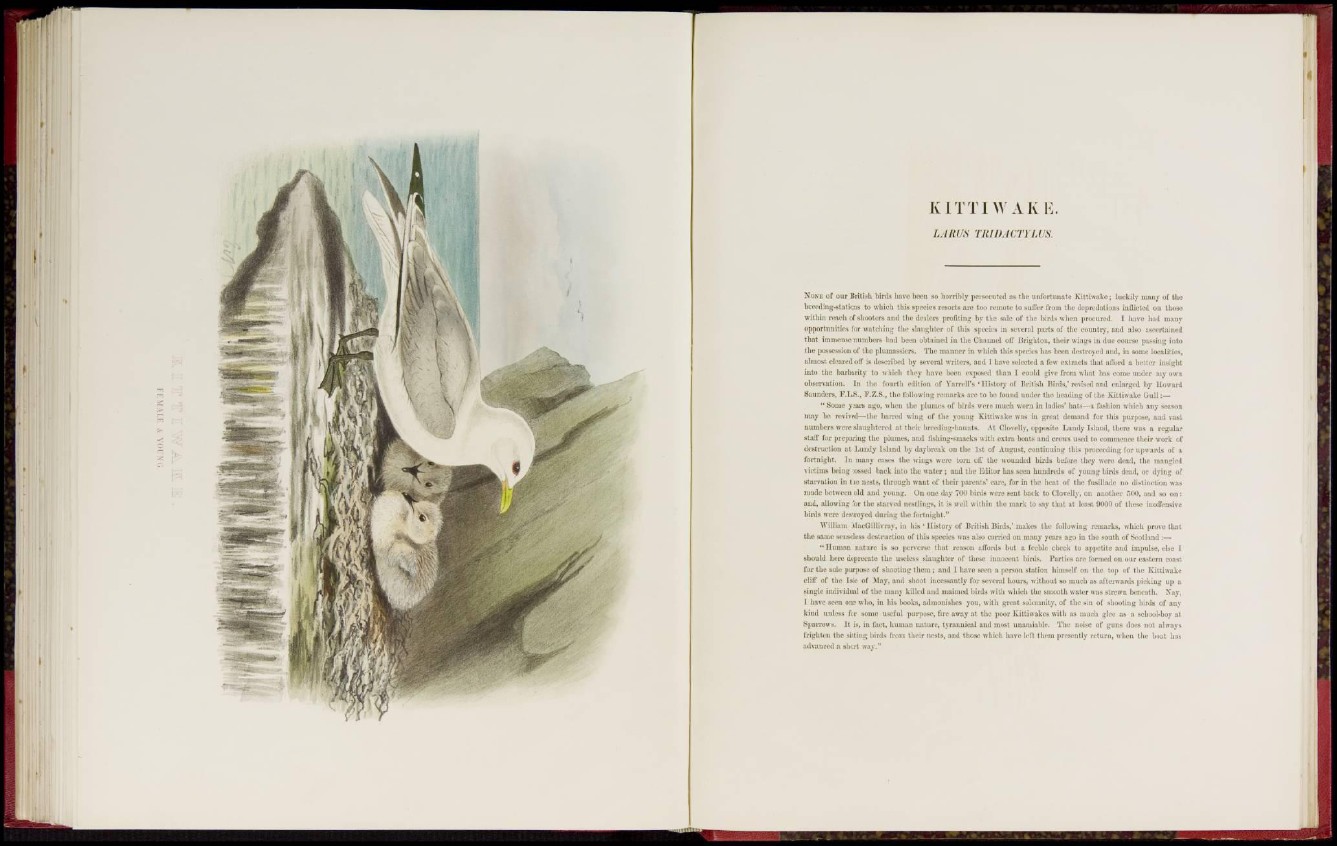
K I T T I W A K E.
LARV8 TBIDACTYL US.
NOTE of our British, birds have bceu so horribly persecuted us the unfortunate Kittiwale; luckily many of tliu
hroodiug-slauons to which this specie-, resorts are too remote to sull'er from the depredations indicted on those
within reach of shooters ami the dealers profiting by the sale of the birds when procured. 1 have hud many
opportunities for watching tin* slaughter of this species in several parts of the country, and also ascertained
that immense numbers had been obtained in Ihe Channel off Brighton, their wings in due course passing into
the possession of the pluiuassiers. The manner in which this species has been destroyed and, ill some localities,
almost cleared off is described by several writers, and I have selected a few extracts that afford a better insight
into the barbarity to which they have been exposed than I could give from what has come under my own
observation. In the fourth edition of Yarrell's ' History of British Birds,'revised and enlarged by Howard
Saunders, F.L.S., F.Z.S., the following remarks are to be found under the heading of the Kittiwake Gull:—
" Some years ago, when the plumes of birds were much worn iu ladies' bats—a fashion which any season
may bo revived—the barred wing of the young Kittiwake was in great demand for this purpose, and vast
numbers were slaughtered at their breeding-haunts. At Clovelly, opposite Lundy Island, there was a regular
staff for preparing the plumes, and fishing-smacks with extra boats and crews used to commence their work of
destruction at Lundy Island by daybreak ou the 1st of August, continuing this proceeding for upwards of a
fortnight. In many cases the wings were torn off the wounded birds before they were dead, the mangled
victims being tossed back into the water ; and the lilitor has seen hundreds of young birds dead, or dying of
starvation in the nests, through want of their parents' care, for in the heat of the fusillade no distinction was
made between old and young. On one day 700 birds were sent buck to Clovelly, on another 500, and so on:
and, allowing for the starved nestlings, it is well within the mark to say that at least 0000 of these inoffensive
birds were destroyed during the fortnight."
"William .MacGillivray, in his 1 History of British Birds,' makes the following remarks, which prove that
the same senseless destruction of this species was also carried ou many years ago iu the south of Scotland :—
" Human nature is so perverse that reason affords hut a feeble check to appetite and impulse, else I
should here deprecate the useless slaughter of these innocent birds. Parties are formed on our casLcru coast
for the sole puqiosc of shooting them; and I have seen a person station himself on the top of the Kittiwake
cliff of the Isle of May, and shoot iuecssantly for several hours, without so much as afterwards picking up a
single individual of the many killed and maimed birds with which the smooth water was strewn beneath. Nay,
I have seen one who, iu his books, admonishes you, with great solemnity, uf the sin of shouting birds of anykind
unless for some useful purpose, lire away at the poor Kittiwakes with as much glee as a schuol-hoy at
Sparrows. It is, in fact, human nature, tyrannical and most uuaiuiable. The noise of guns does not always
frighten the silting Girds from their nests, and those which have left them presently return, when the boat has
advanced a shurt way."